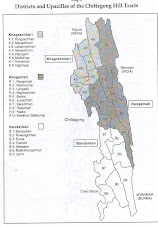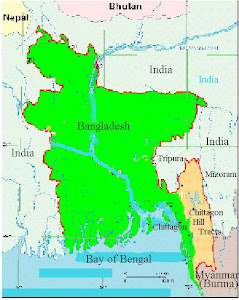Kabita Chakma THE news heading "Another Kaptai dam for power
generation: Govt seeks US help," reported in The Daily Star, on Friday
January 22, made me consciously question: Am I reading this correctly?
Is it a hoax or a mistake? Or is it a joke?
The story that followed was: "The government sought assistance from
the USA in power sector for building another Kaptai dam for doubling
hydropower generation from the lake waters in Rangamati hill
district."
Questions arise immediately: Why hasn't there been any information on
this in any news media? Why haven't local communities been informed
about such a large project?
Shortly after the news was released, phone calls, e-mails, poured in
from many Jumma and some non-Jumma expressing grave concerns:
"Another dam in CHT ? Using US money at the expense of Jumma land? Who
knows how much Jumma land will be grabbed and then the power will be
used to run factories in the plain land?"
"I wonder whether the state minister for environment had any
consultation with the people of CHT before requesting for help to US
government?"
"If this proposal for a second Kaptai dam is a serious proposal -- it
seems so preposterous, I still have trouble believing the government
would propose such a thing."
"The last dam cost us very very dearly."
"We should act immediately before its too late."
We have since learnt that even local institutions, like the Rangamati
District Council and the CHT Regional Council, are looking for
information on the project proposal. It has been confirmed that not a
line was ever published about the project until the government sought
financial assistance from the US on January 22.
Does the government really believe that another Kaptai dam is a
justified, viable, sustainable development proposal?
If the government believes in another Kaptai dam project, why has the
government been clandestine about the project? Why hasn't the
government discussed the project with either the locals or their
representatives? Why hasn't the government discussed the project in
any public forum?
The Bangladesh government, as a democratic constituency, has an
obligation to inform its own people about any project, which will
affect them directly. In turn, its people have the right to know what
will happen to them, to their homesteads, farms, woods, lives and
livelihoods if another lake is created for doubling of electricity
production.
There are now more questions than answers, more distrust than trust in
the government. One key question arises: is this another act of
treachery against the indigenous Jumma of CHT by its own government?
Our memory of the existing Kaptai dam, built in the 1960s with the
assistance of USAID, without public information and local
consultation, has not been erased from Jumma's collective memory. It
continues to haunt thousands of Jummas of different generations.
It made 100,000 people (more than a quarter of the Jumma population)
homeless and jobless. It destroyed 40 per cent of the most valuable
agricultural land of the CHT. It also triggered over two decades of
undeclared war.
There remain ongoing issues regarding the economic injustices against
the hill people as an outcome of the inequitable sharing of
electricity from the first Kaptai dam. Only a tiny amount of the
promised compensation for the first dam was ever delivered and even
today, about 50 years later, nearly 95 per cent of the electricity
produced by the Kaptai dam is used for the development of the plains,
not the CHT where the electricity is produced. Hence, there is a
substantial economic debt owed to the peoples of the CHT by the state.
For the near 50 years of the existence of the Kaptai dam the CHT has
suffered from a lack of electrical power. One would justifiably think
that CHT should have the first priority of use of the electricity of
the Kaptai dam and the surplus should go to the national grid. But
instead, electricity produced by the Kaptai dam is delivered directly
to the national grid, while electricity is returned to CHT only
through Hathazari, a station at Chittagong district.
A respectful relationship between the CHT people and the state will
remain difficult without addressing the existing economic injustices
involved in the unfair distribution of electricity production.
Depriving the CHT of benefit of the electricity can only exacerbate
the injustices against the CHT people.
If there were ever to be another dam in the CHT, two steps seem necessary:
Firstly the financial, moral and ethical injustices that arose from
the first dam be made good.
Secondly, the local people, their institutions and representatives
must be substantially (not tokenistically) involved in the inception,
planning, decision-making levels of the project and in its delivery
and in maintenance.
Kabita Chakma, formally trained as an architect, is the Coordinator of
CHT Jumma Peoples Network of the Asia Pacific. She is also a writer
and has published her work in diverse areas, including human rights,
environment, literature and architecture.
The Daily Star, February 4, 2010
skip to main |
skip to sidebar


Map of Bangladesh

CHTs is number one Milliary zone in the world


Ministry of Chittagong Hill Tracts Affairs
The United Nation
The IJPMNA
This page provides information of the minority Indigenous Jumma Peoples in Chittagong Hill Tracts (CHTs) Bangladesh.
Contact with this please write:-ijpnusa@yahoo.com
Contact with this please write:-ijpnusa@yahoo.com
About Us
Location of Jummaland

Jumma Videos
- The BANDARBAN SADAR
- The Rowangchari
- The Ruma
- The Lama
- The Thanchi
- The Alikadom
- The Naikhkhongchari
- The RANGAMATI SADAR
- The Baghaichari
- The Langudu
- The Nanyachar
- The Barkal
- The Jurachari
- The Bilaichari
- The Kaptai
- The Rajsthali
- The Kawkhali
- The KHAGRACHARI SADAR
- The Manikchari
- The Laksmichari
- The Mahalchari
- The Matiranga
- The Ramgarh
- The Dighinala
- The Panchari
Audio & Video
Jumma Natok (Drama)
International Support
Educational Institution
Religious Organization
Buddhist Studies

Map of Bangladesh
Mission of Bangladesh
About Bangladesh
Bangali Audio Songs
Bengali News

CHTs is number one Milliary zone in the world
Online Audios
Refugee in Homeland

Jumma Picture

Blog Archive
About Me
- The Indigenous Jumma Peoples Movement in North America
- The Chittagong Hill Tracts (CHT) region comprises three districts: Banderban , Khagrachari and Rangamati. The districts comprise seven main valleys formed by the Feni, Karnafuli, Chengi, Myani, Kassalong, Sangu and Matamuhuri rivers aid their tributaries and numerous hills, ravines and cliffs covered with dense vegetation, which are in complete contrast to most other districts of Bangladesh, which consist mainly of alluvial lands. Geographically the CHT can be divided into two broad ecological zones: (a) hill valley, (b) agricultural plains. It is surrounded by the Indian states of Tripura on the north and Mizoram on the east, Myanmar on the south and east and Chittagong district on the west.
